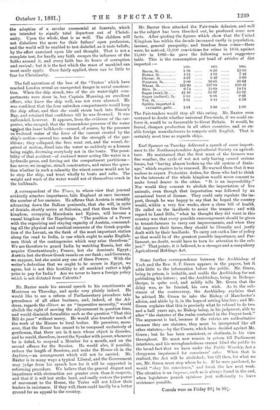The full narratives of the loss of the 'Teuton' which
have reached London reveal an unexpected danger in naval construc- tion. When the ship struck, two of the six water-tight com- partments were stove in, but Captain Manning, an excellent officer, who knew the ship well, was not even alarmed. He was confident that the four unbroken compartments would keep the ship afloat, and that she could steam back into Simon's Bay, and retained that confidence till he was drowned. It was unfounded, however. It appears, from the evidence of the car- penter, who escaped, that the tremendous pressure of the water aninst the inner bulkheads—caused, of course, by the pressure on enclosed water of the force of the current created by the ship's motion—proved too much for the strength of the par- titions; they collapsed, the fires went out, and the vessel, de- prived of motion, dived into the water as suddenly as a human being might, drowning everybody not in the boats. The possi- bility of that accident—of enclosed water acting like water in a hydraulic press, and forcing out the compartment partitions— has never, we imagine, struck constructors, and raises the ques- tion whether in such a calamity the wisest course would not be to stop the ship, and trust wholly to boats and rafts. The weight and wash of the water would not of themselves crush in the bulkheads.






























 Previous page
Previous page